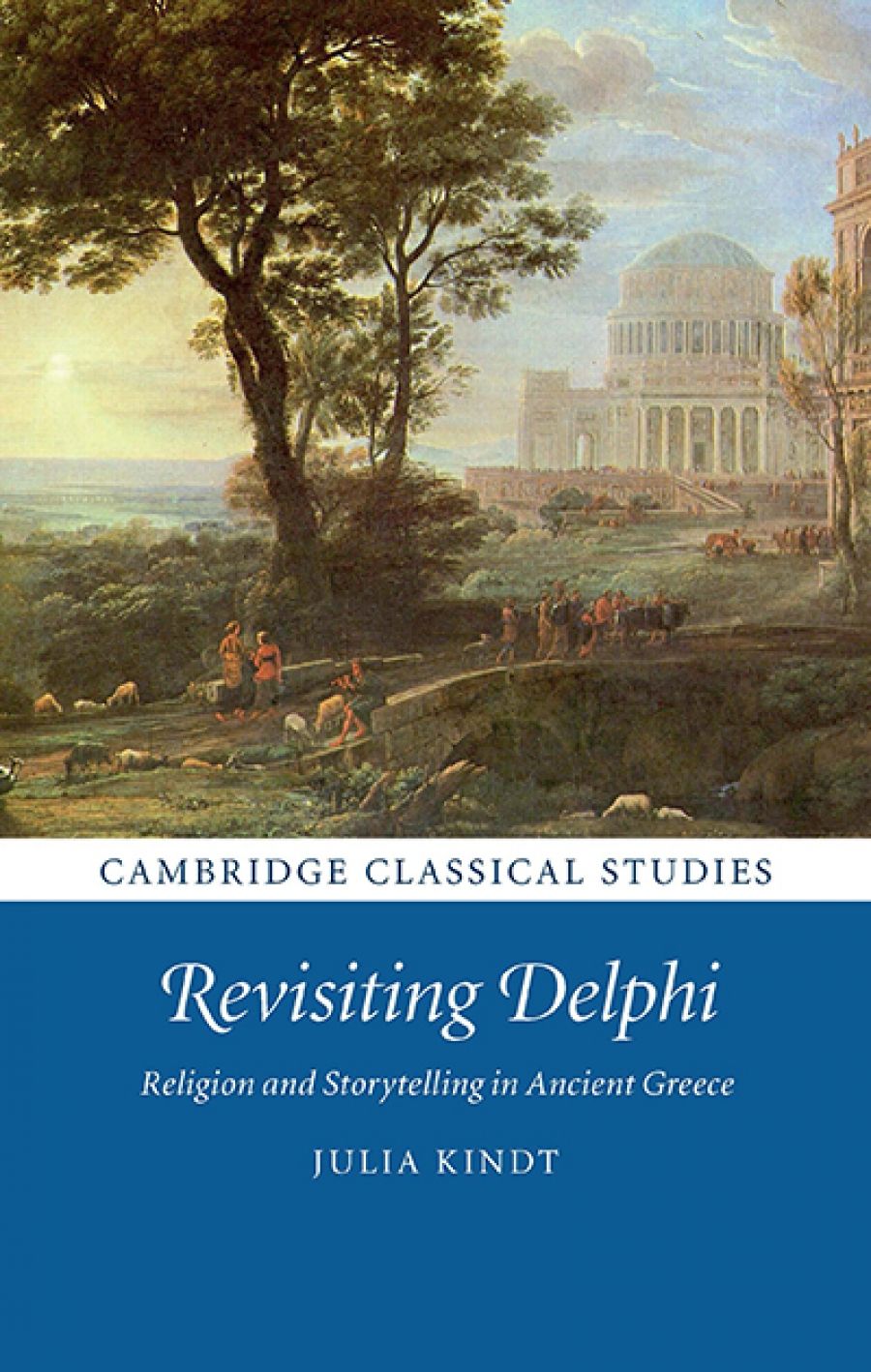
- Free Article: No
- Contents Category: Classics
- Custom Article Title: Greta Hawes reviews 'Revisiting Delphi: Religion and storytelling in Ancient Greece' by Julia Kindt
- Custom Highlight Text:
Re-visiting Delphi. The re-iteration is plain necessity: if Italo Calvino is correct and the classics can only ever be reread, then even a first-time visitor to Delphi is revisiting it. That evocative sanctuary barely clinging to the slopes of Parnassus is simultaneously place and commonplace (the Greek topos encompasses both ...
- Book 1 Title: Revisiting Delphi
- Book 1 Subtitle: Religion and storytelling in Ancient Greece
- Book 1 Biblio: Cambridge University Press, $135 hb, 230 pp, 9781107151574
Kindt’s book takes up the stories which swirl around Delphi and plays out the effects of the Pythia’s riddling language. The central fascination is not the mechanics of a mantic woman putting forth the god’s answers, but rather the human drama of how accessing such knowledge created futures. Kindt argues that what happens mattered less than how it happens; thus the story of Delphi lies not in what inspired the Pythia to speak with super-human insight, but in how her words came to be understood as true. Kindt’s return to Delphi takes storytelling seriously. It seeks finally to banish the view – under-pinned by now-antiquated ideas of how ancient history should work – that ambivalence and anxieties about human nature have nothing to do with Delphi. Our still-standard collection of Greek oracles, Fontenrose’s The Delphic Oracle (1978), makes stringent historicity the highest criterion and thus categorises as ‘legendary’ (read: dismisses as inauthentic) stories central to Delphi’s fame. This would banish from Delphi anything too literary, too complex, too vicariously attested, too perfectly scripted, too unlikely to bear scrutiny against the actual operations of the Delphic sanctuary. It would be a comfortable world indeed if we could thus separate reality from the chaff of those things merely said about it, and leave them to blow away in the wind.
In revising Fontenrose, Kindt is certainly not a pioneer, but she is a welcome and committed voice. She gets at what Fontenrose simply could not comprehend: what is the thrall of these stories? What do stories do? Kindt picks a well-trodden path through Herodotus, Euripides, and Plato and finds that the apparent clarity offered by the Pythia’s pronouncement merely intensifies other types of uncertainty. Fresher meat appears in two later chapters, which open up a discussion of ‘object culture’, the particular ways in which the Greeks interacted with the material realities of their world. Here we are faced with new paradoxes: Is it murder if a statue of a dead athlete topples over and kills his former rival? Which strange experiences are random, and which evidence of divine will? What is godly in a cult statue produced by human hands? Through these stories, we see in play what Jennifer Larson has described as the ‘intuitive’ beliefs of Greek theology: the assumptions, under-theorised and often mutually contradictory, that animated the Greeks’ everyday relationship to the divine beyond.
 The Temple of Apollo at Delphi, Greece (photograph by Paul Stephenson, Wikimedia Commons)
The Temple of Apollo at Delphi, Greece (photograph by Paul Stephenson, Wikimedia Commons)
Arising ultimately from Kindt’s discussions is a commitment which goes beyond the centrality of human agency in oracular stories, to embrace the agency of the storytelling principle itself. Interpreting oracular language is a spur to historical action, and a template for the historiographical craft. Such aetiological patterning fixes itself within the lived reality of antiquity. By this I do not mean the lived reality of some historical ‘Socrates’ or of some particular debate about a detail of citizenship amongst the Athenian dēmos, but what a structuralist might term mentalité, a way of thinking about the world, of perceiving reality and expecting it to work; a way of ascribing causality to events with only a temporal relationship. Only through the act of storytelling does the world acquire its meaning; thus Kindt’s antiquity is no staid narrative canon, but a world ever in the process of forming. Each oracular story is itself a revisiting of an ever-emerging topos, a contribution to the evolving status of Delphi as locus classicus for grappling with concepts of fate, agency, interpretation, and the randomness of human affairs.
Like the best work in Classical Studies, this book boldly takes up a familiar topic and leaves it simultaneously more unsettling and less outlandish. More unsettling, because we encounter on the ground an ancient literature not pre-packaged as edifying lessons: we come face-to-face with the selfish, gutless Apollo of Euripides, statues capable of murder, a man incapable of laughter, and a Delphic priest – the esteemed Plutarch no less – quite unable to explain satisfactorily his sanctuary’s traditions. But this antiquity also has a familiar ring to it. The story of Delphi is one of human frailty and heroism, of a history built up from cupidity, fragility, arrogance, restlessness, longing, and curiosity. Divining the will of the pagan gods turns on those obsessive, trans-temporal habits of the quite human mind: the desire to know the world accurately, to narrativise its apparent workings, and to leave open its ultimate inscrutability.


Comments powered by CComment